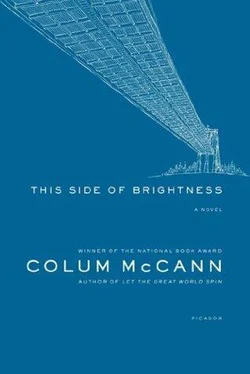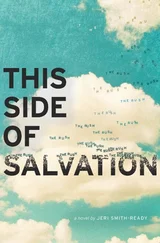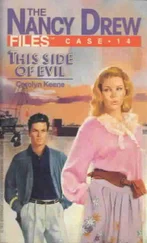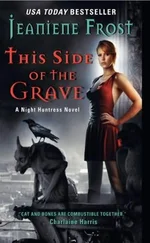“Look at you, hey, the king of spades!”
But Walker takes no offense. He knows there is a democracy beneath the river. In the darkness every man’s blood runs the same color — a dago the same as a nigger the same as a Polack the same as a mick — so Walker just laughs, puts the winnings in his pocket, and deals the second hand.
* * *
Out of the manlock, still in their hats, the sandhogs enter the compressed air of the tunnel. More than one hundred of them, they slosh through the mud. Waterboys and welders, carpenters and grouters, hoist runners and electricians, they remove their caps and overcoats in the heat. Some have tattoos, others have potbellies, a few are emaciated, most are sinewy. Nearly all of them have worked as miners before — in Colorado, Pennsylvania, New Jersey, Poland, Germany, England — with legacies of blackening lungs to prove it. If they could reach down into their throats they could chisel out diseases from their lungs. The tar and the filth would come away in their fingertips. They could hold a piece of flue-colored tissue and say, This is what the tunnels have done to me.
There have been many deaths in the tunnel, but there’s a law the sandhogs accept: you live as long as you do until you don’t.
Bare electric bulbs flicker, and the men move through a liquidy light, casting fiddleback shadows on the walls. The shadows melt and skirt and coalesce, growing longer and then shorter. In the middle of the tunnel runs a thin rail line, which will later be used for transporting equipment and mud. The men step along the tracks, and at various points they leave the convoy. Metal lunch boxes are thrown to the ground. Rosary beads are produced from pockets. The men remove their shirts in the temporary exuberance of beginning work. Here, the closure of a fist to show up an arm muscle. There, the pullback of shoulders to reveal a massive chest. Behind, the thumping sound of a fist into a palm.
But the four muckers — Walker, O’Leary, Vannucci, and Power — don’t stop to talk. They have to walk the full length of the tunnel, under the cast-iron rings, past machinery and vises and bolts and giant wrenches and stacked bags of Portland cement. Walker goes out in front, balancing on one of the metal rails, while the three others place their feet carefully on the wooden ties. Their shovels swing down by their legs. Walker’s has his name carved into the shaft, O’Leary’s has a bent metal lip, Power’s has toweling wrapped around the handle, and Vannucci’s, once minutely cracked, is held together with a metal sleeve. They continue along, right into the belly of blackness.
“Hotter than a whore’s kitchen today,” says Power.
“Ain’t that the truth?”
“Ever been in a whore’s kitchen?”
“Only for breakfast,” says Walker. “Grits and eggs over easy.”
“I swear! Listen to the youngster!”
“And a little sizzling bacon.”
“Whooeee, I like that.”
“Backside bacon. With a little on the rind.”
“Now we’re talking!”
At the head of the tunnel they reach the Greathead Shield, the last safety precaution, a giant piece of metal that is pushed through the river by hydraulic jacks. If there is an accident, the shield will hold the mud back like a lid on a cylinder. But the four men must go even further. They each take a deep breath and then stoop to enter the door in the shield. It is like entering a tiny room at the end of the world: seventy-five square feet, all darkness and damp and danger. Here, the riverbed is propped up with long breast boards and huge metal jacks. Above the men’s heads a steel ceiling juts out to protect them from falling rock and sliding mud. Right in front of their eyes hangs a wire-caged bulb, revealing mounds of dirt and puddles of filthy water. The bulb has a pulse to it, the electricity not constant. Sloshing through the water on the floor of the room, Nathan Walker and Con O’Leary reach out and touch the planks for good luck.
“Touch wood, buddyblue.”
“I’m touching,” says O’Leary.
“Goddamn, even the planks done got warm.”
By the end of the day the muck behind the planks will be gone, carted out on the narrow railway track, loaded on carriages, and pulled by wheezing draft horses to a dump site in Brooklyn. Then the Greathead Shield will be pushed forward once more. Silently, the men challenge themselves to penetrate the riverbed further than ever before, maybe even twelve feet if they’re lucky. They set up a platform to stand on. Walker unwinds a jack and Vannucci takes down two breast boards to create a window for their shoveling. Power and O’Leary step back and get ready to load the mud. The four will swap places throughout the day, shoveling and loading, loading and shoveling, slashing their shovels into the soil, burying the metal edges deep.
* * *
Nathan Walker will later sit shivering in the hospital lock and say to his friends, “If only them other guys knew how to talk American, nothing bad woulda happened, nothing at all, not a damn thing.”
* * *
He is the best of them, even though he’s only nineteen years old. The work is brutal, but Walker is always the first to begin digging and the last to finish.
Tall and muscular, he sends ripples along his arm with just one movement of the shovel. He drenches his skin in sweat. The other riverdiggers envy his fluidity, the way the shovel seems to meld with his whole torso, the quiet mastery of his burrowing, the blade making repeated ellipses in the air: one, two, three, strike, return. He stands wide-footed on the platform, wearing blue overalls ripped at the knees, his red hat sideways on his head, a string sewn into the brim so he can tie it under his chin. Every ten seconds the oozy muck comes out from between the breast boards at hip level. Walker turns up shells as he digs, and he rubs them clean with his fingers. He would like to find a slice of bone, an arrowhead, or a piece of petrified wood, but he never does. Sometimes he imagines plants growing down there, yellow jasmine and magnolias and huckleberry bushes. The edges of the Okefenokee swamp come back to him in waves, murky brown waters that pile into the Suwanee of his home.
Walker has been digging for two years. He arrived on a train from Georgia, the steam whistle ringing high and shrill in his ears.
The steel shield extends above his head, but much of the time he has to go beyond the shield where there’s no protection. None of the men wear helmets, and all that’s left is just them and river soil.
Walker takes off his shirt and digs bare-chested.
Only the river’s muck is cool against his skin, and at times he smears it on his body, over his dark chest and ribs. It feels good to the touch, and soon he is filthy from head to toe.
He knows that at any moment an avalanche of muck and water could sweep the men backward. They could drown with the East River going down their throats, strange fish and odd rocks in their bellies. The water could pin them against the Greathead Shield while the alarm sounds — a frantic rat tat tat tat of tools on steel — while the men further back in the tunnel scramble toward safety. Or escaping air could suck them against the wall, hurl them through space, shatter their spines against a breast board. Or a shovel might slip and slice a man’s forehead clean open. Or fire could lick through the tunnel. Or the bends — the dreaded bends — could send nitrogen bubbles racing to their knees or shoulders or brains. Walker has seen men collapse in the tunnel, grasping at their joints, their bodies ribboned in sudden agony; it’s a sandhog’s disease, there is nothing anyone can do about it, and the afflicted are taken back to the manlock, where their bodies are decompressed as slowly as possible.
But these things don’t scare Walker — he is alive, and in yellowy darkness he uses every ounce of his body to shove the river tunnel along.
Читать дальше












